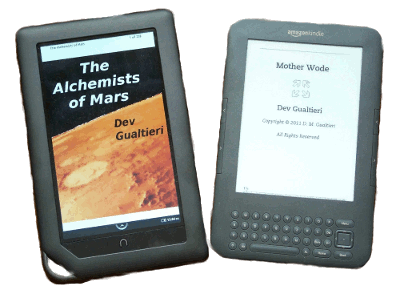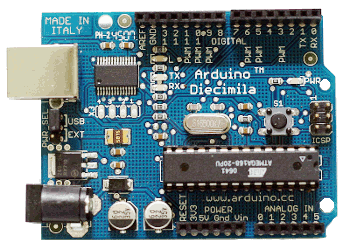Open Access
November 14, 2011
The
Internet is a
disruptive technology. It's created many business opportunities, while at the same time destroying existing businesses. Local record shops, into which I would pour at least $250 yearly on an eclectic mix of music, first on
vinyl, and then on
CDs, are gone. They've been replaced by sites such as the
iTunes Store. Local
book shops are nearly gone, replaced by sites such as
Amazon and
Barnes & Noble.
Electronic delivery of books via the Internet has started to push
print books to extinction. I own both a color
Nook, and a
Kindle. I was an early adopter of the Internet as my sole news source, having canceled my
newsprint newspaper more than fifteen years ago. Does anyone still buy the venerable
TV Guide, now replaced by the electronic guide built into
cable television services?

Author's Color Nook
and
Monochrome Kindle.
One day, you may actually be able to buy these two Tikalon Press books.
(Photo by Author)
The Internet has become much more disruptive of the business
status quo in another sense. It's very easy to share things at no cost, and it's easy to collaborate with people worldwide on interesting projects. This blog is one example of such sharing.
Linux was an early example of groups of people coming together to produce a useful item, distributed at no cost, for the
common good.
Wikipedia, for which I've written articles, is another example of people donating their time for the public good.
Scientists are now revolting against
journal publishers by publishing on
open access web sites, such a
PLoS ONE. They noticed that the publishers had already placed most of the burden of editing and formatting of their manuscripts upon the scientists themselves. At the same time, their articles could only be accessed by individuals and institutions who could pay hefty subscription fees.
The purpose of publication, of course, is to make public, and having a nicely formatted manuscript is all you need to make your work public on the Internet. Many scientists,
engineers and
mathematicians are posting nicely formatted papers as "
preprints" on the
arXiv Preprint Server.
It takes special individuals to build our better future.
Steve Jobs was arguably a visionary who produced many useful and successful technologies; but Steve's devices were restricted.
Apple wants to run the entire show, and it isn't possible for individuals to build onto Apple's baseline offerings. Of course, Apple is a business, it's
raison d'être is to make money. As I learned many years ago, businesses are not
amoral; they are "
not moral," in the sense that rules of morality do not apply to them. They are only bound by
laws.
Bruce Perens, who is an advocate for
open source software, has just published the first issue of the
Open Hardware Journal.[1] Open hardware is the complementary idea to open software. It consists of "things" - actually recipes to make things - that are donated to the
public domain. Some of these could be
patentable ideas that the
inventor decides to donate to the public domain. Says Perens,
"Open Hardware means sharing the design of physical or electronic objects with the public, similarly to Open Source software. The right to use, modify, redistribute, and manufacture, commercially or as a non-profit, is granted to everyone without any royalty or fee. Thus, Open Hardware designers hope to enrich society by developing a library of designs for useful objects that everyone can make, use, and improve."
The idea of open hardware isn't new. Several years ago, the
Arduino project put an inexpensive
microcontroller design into the public domain.[2] The result of this is a plethora of microcontroller boards with various
input/output interface options that can be applied to anything from
model railroading to control of scientific experiments. The designs and control software are free, but there are many vendors who sell kits and assembled products to make microcontrol easier for non-engineers.[3-4]

The Arduino Diecimila, circa 2008. The Arduino series of microcontroller boards is an open hardware project that also includes open software.
(Via Wikimedia Commons))
Of course, everyone can't give away everything for free. People still need to make a living. Much open source software is supported by companies that sell computing services. They realize that their
proprietary software needs to run on a stable platform, such as Linux. They pool their efforts with other companies to constantly update the platform, and there are winners all around.
References:
- Open Hardware Journal Web Site. First issue PDF download via Amazon Content Delivery Network (3.5 MB).
- Arduino Home Page.
- Arduino Worldwide Hardware Sources.
- Sparkfun Electronics, a popular US source for Arduino boards and kits.
Permanent Link to this article
Linked Keywords: Internet; disruptive technology; vinyl; compact disc; CD; iTunes Store; book shop; Amazon; Barnes & Noble; electronic delivery; print book; Nook; Kindle; newsprint; newspaper; TV Guide; cable television; Tikalon Press; Linux; common good; Wikipedia; scientist; journal; open access; PLoS ONE; engineer; mathematician; preprint; arXiv Preprint Server; Steve Jobs; Apple, Inc.; morality; amoral; not moral; law; Bruce Perens; open source software; Open Hardware Journal; public domain; patent; inventor; Arduino; icrocontroller; input/output interface; model railroading; Wikimedia Commons; proprietary software.